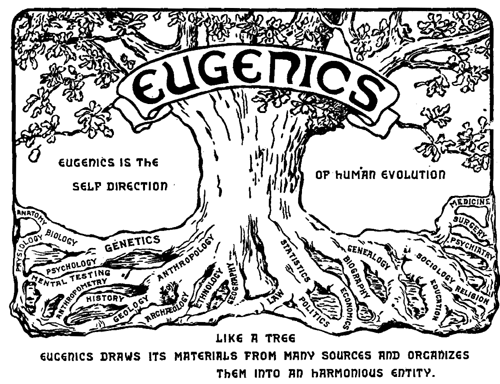- 24 Jul 2005 13:37
#684368
Why Eugenics?
Throughout the history of human developement, individuals have had the unfortune of being born with specific defects which hindered their abilities to function in society and/or were lethal to that individual. These diseases are numerous, but include things like heart disease, diabetes, epilepsy, schizophrenia, sickle cell anemia, down syndrome and Klinefelter's syndrome - just to name several. These either were caused by mutation, duplication of a chromosome, or a defective gene. Around 4,000 genetic disorders are known to us, mucoviscidosis being the most common.
Eugenics seeks to enhance the genetic quality of the human gene pool much the same way that early humans used selective breeding to evolve to the point we are now. The main differences being that now we have technology to add our natural evolution, and then there is the fact that we have progressed to a point now where the standard of living is so high that the worst among us are living to breed and pass on their genes; where a thousand years ago, they wouldn't have got the chance. Eugenics also offers the chance for humans to evolve past their physical point now.
How?
Selective Breeding - The first an easiest way to carry out eugenics is to breed selectively. Logic dictates that if person with good genes breeds with a person with good genes, the probabilities are minimal that their offspring would have a hereditary disease. However, If you take a person who already has a hereditary disease and have them breed, the chances are much greater the offspring would inherit the disease. All other animals practice this type of eugenics.
Birth Control - This would be a voluntary or forced procedure which would prevent pregnancy, and thus prevent undisired genes from being passed on.
Extermination - This one pretty much speaks for it's self. Kill all the one's which are considered to have a hereditary disease. Unlike birth control methods, this is the most permanent form of sterilization.
Genetic Engineering* - Human genetic engineering deals with the modification of a human by changing his or her genetic structure. This research is usually done to study gene expression and various human diseases. However, some drastic demonstrations of gene modification have been made with mice and other animals: a mouse with an 'ear' on its back, glow in the dark mice, etc. have been created (although mostly as a PR/"see if they could actually do it" type effort). Testing on humans has been generally deemed off limits. Genetic engineering could help alleviate many problems, such as diabetes, by inserting/removing genes in the correct places (thus causing the appropriate cells of the body to fix the problem). Genetic engineering to drastically change people's genomes could enable people to regrow limbs, spine, the brain, be stronger, faster, have better reaction time, be smarter, survive underwater longer, the abilities are endless. If nature has created it, it could be carried over to the human body and expressed. Genetic engineering could bring a number of improvements to our race. The human race would be able to adapt and survive more circumstances than currently possible. For example, humans can't breathe the atmosphere on Mars, nor live in the sea; genetically engineered people, theoretically, could. Populating areas currently impossible without external technology would no longer be as difficult.
* - From: http://en.wikipedia.org/wiki/Human_Genetic_Engineering
Also a good site: http://www.bootstrike.com/Genetics/Home/index.html

Throughout the history of human developement, individuals have had the unfortune of being born with specific defects which hindered their abilities to function in society and/or were lethal to that individual. These diseases are numerous, but include things like heart disease, diabetes, epilepsy, schizophrenia, sickle cell anemia, down syndrome and Klinefelter's syndrome - just to name several. These either were caused by mutation, duplication of a chromosome, or a defective gene. Around 4,000 genetic disorders are known to us, mucoviscidosis being the most common.
Eugenics seeks to enhance the genetic quality of the human gene pool much the same way that early humans used selective breeding to evolve to the point we are now. The main differences being that now we have technology to add our natural evolution, and then there is the fact that we have progressed to a point now where the standard of living is so high that the worst among us are living to breed and pass on their genes; where a thousand years ago, they wouldn't have got the chance. Eugenics also offers the chance for humans to evolve past their physical point now.
How?
Selective Breeding - The first an easiest way to carry out eugenics is to breed selectively. Logic dictates that if person with good genes breeds with a person with good genes, the probabilities are minimal that their offspring would have a hereditary disease. However, If you take a person who already has a hereditary disease and have them breed, the chances are much greater the offspring would inherit the disease. All other animals practice this type of eugenics.
Birth Control - This would be a voluntary or forced procedure which would prevent pregnancy, and thus prevent undisired genes from being passed on.
Extermination - This one pretty much speaks for it's self. Kill all the one's which are considered to have a hereditary disease. Unlike birth control methods, this is the most permanent form of sterilization.
Genetic Engineering* - Human genetic engineering deals with the modification of a human by changing his or her genetic structure. This research is usually done to study gene expression and various human diseases. However, some drastic demonstrations of gene modification have been made with mice and other animals: a mouse with an 'ear' on its back, glow in the dark mice, etc. have been created (although mostly as a PR/"see if they could actually do it" type effort). Testing on humans has been generally deemed off limits. Genetic engineering could help alleviate many problems, such as diabetes, by inserting/removing genes in the correct places (thus causing the appropriate cells of the body to fix the problem). Genetic engineering to drastically change people's genomes could enable people to regrow limbs, spine, the brain, be stronger, faster, have better reaction time, be smarter, survive underwater longer, the abilities are endless. If nature has created it, it could be carried over to the human body and expressed. Genetic engineering could bring a number of improvements to our race. The human race would be able to adapt and survive more circumstances than currently possible. For example, humans can't breathe the atmosphere on Mars, nor live in the sea; genetically engineered people, theoretically, could. Populating areas currently impossible without external technology would no longer be as difficult.
* - From: http://en.wikipedia.org/wiki/Human_Genetic_Engineering
Also a good site: http://www.bootstrike.com/Genetics/Home/index.html











 - By Potemkin
- By Potemkin